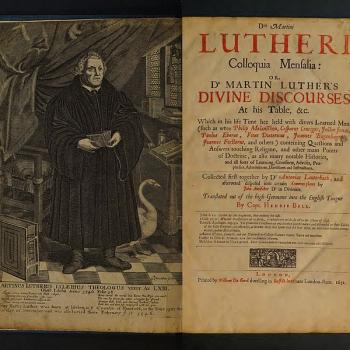The reverse implication, however, does seem to hold—if you're an atheist, you're going to need a mechanistic/materialistic creation story of how we got here, and Darwinism, by providing such an account, fits the bill. No wonder that atheists love Darwin (Richard Dawkins: "Darwin made it possible to be an intellectually fulfilled atheist"; Will Provine: "Evolution is the greatest engine of atheism ever invented"; etc.). Giberson and Collins are right to be concerned about the connection between atheism and evolution, but in arguing as they do that evolution need not be conducive to atheism, the burden of proof is on them.
Hence, when Giberson and Collins put their cards on the table, this is what they write: "The broadest and most general question we are addressing in this book is how to understand evolution as the way that God created life. This question, in fact, is the basis for this entire book" (114). They continue, "We want to argue most insistently that God's creative work can be done through the laws of nature, and not merely by breaking or suspending those laws" (115, emphasis in original). This is also why they are so opposed to intelligent design, because, in their view ID "promotes the idea that nature has gaps in it that God must intervene to fill. According to ID, nature is powerful and capable of accomplishing much, but some things—like the origin of the bacterial flagellum—require that God must 'step in' in an unusual way. This seems piecemeal and incoherent to us" (190).
But in fact, ID is not an interventionist theory. ID is, in the first instance, concerned with the detectability of design. But detecting the activity of a designing intelligence says nothing, without further investigation and evidence, about how the designing intelligence acted, whether by discrete interventions or by continuous infusions of information or by front-loading of all the necessary information. Giberson and Collins miss this point. Hence they write, ID "suggests that design may be detected in some places and not others. In contrast, BioLogos affirms that God is present everywhere in nature and not just in the gaps in our knowledge" (194). In detecting design, we can say where design is. But in failing to detect design, we can't say where design isn't. Design detection eliminates false positives (false ascriptions of design to things that are not, or may not, be designed) but it can never eliminate false negatives (false denials of design to things that are in fact designed).
Most ID proponents are Christians and believe, like BioLogos, that God is present and active everywhere in nature. Yet we hold that in some cases God makes his activity more obvious than in others. Design detection calls forward these more obvious instances of design. Moreover, methods of design detection operate over a limited domain. I, for instance, have never said that specified complexity, as a method of design detection, covers every possible case where design might be detected. Far from it. This method is quite limited and requires situations in which independently given patterns may be identified and events associated with these patterns can objectively be assigned probabilities.
Giberson and Collins' insistence that God work through rather than outside natural laws is problematic but raises some interesting possibilities. It presupposes that nature operates without discontinuities. But how do we know that? Such discontinuities or gaps need not be gaps of ignorance but gaps in the very fabric of nature. This is a logical possibility and one that needs to be considered. As they read the evidence of evolution, no such gaps exist. As I read it, they do (e.g., the Cambrian explosion—but note, there are design theorists who find no gap here, such as Michael Behe). Nature's operations, without the activity of God, might be fundamentally incomplete. Yet such activity need not be construed as "interventions."
According to Giberson and Collins, "The actual patterns of natural history may, in fact, be a combination of pathways specified by laws laid down 'in the beginning' and the steady infusion of divine creativity" (206). This sentence, to which I can say Amen, is entirely consistent with intelligent design. Such infusion of information at the beginning and then continuously thereafter could, in principle, guide an evolutionary process and be consistent with natural laws. But it would not be reducible to natural laws as the scientific mainstream now conceives them (certainly not reducible to a trial-and-error tinkering mechanism such as Darwinian selection).
Years back, John Polkinghorne speculated about a notion he called "active information," which acted orthogonally to ordinary physical causation so that God could direct nature without violating it. I've since developed that notion mathematically in my work with Robert Marks' Evolutionary Informatics Lab (www.evoinfo.org), through which we have published work in this area in standard information-theoretic and computational intelligence journals (for a review paper summarizing our technical work in this area, see "Life's Conservation Law"). Giberson and Collins are right when they say that we don't have a good understanding of how God's creativity gets inputted into nature. But it seems that "active information" can provide some common ground, making room for real teleology that also preserves the integrity of nature. Thus, for all my gripes about this book, I think it does suggest a way forward for a meaningful dialogue among the various parties addressed.
I therefore close with the following statement from their book, which I wholeheartedly endorse and hope presages some fruitful interactions in the future: "We submit that all Christian positions on origins share a commitment to a mysterious and transcendent divine action, and we might as well acknowledge that we are all in that boat together. The conversation needs to be about what is revealed in the details of the creation, not who can explain exactly how God works (for nobody can). We should all start with the affirmation that the world is the product of a transcendent intelligence and then inspect that world to see what we can find out" (192). Amen.




